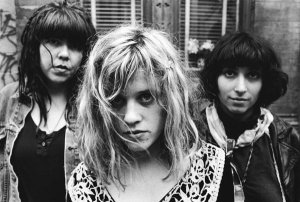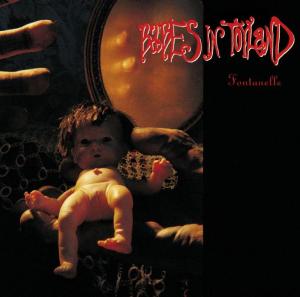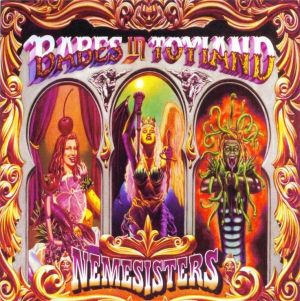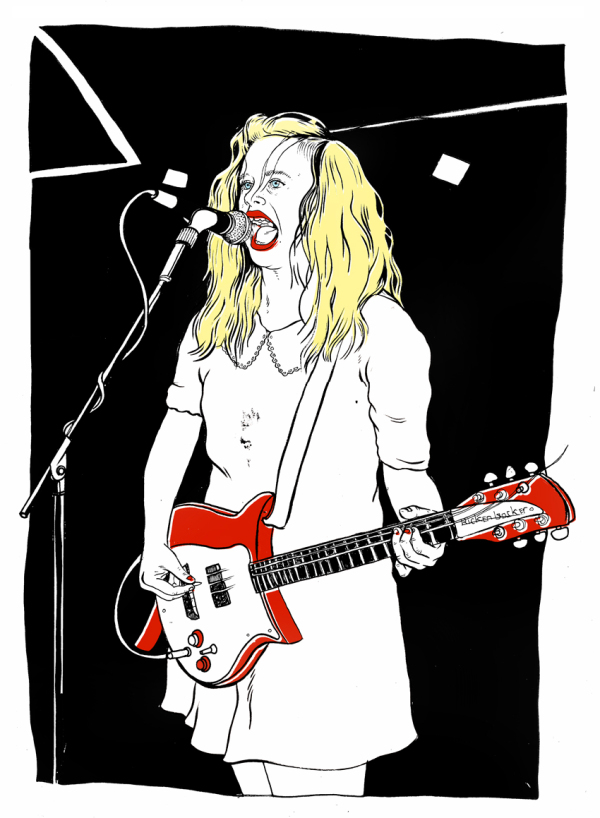Illustration by LOUISE ZERGAENG POMEROY
 BY MEGAN MATUZAK The phone crackles, as Kat Bjelland, lead singer of 90’s all-girl grunge stalwarts Babes In Toyland, clears her throat and says “Hello” from her home in Minneapolis. She has a cold but is in good spirits, she says, because just before the interview, Bjelland got her hands on a 1947 National Tube Amp. “It’s tweed, at a good price and is teeny tiny,” Bjelland says in a baby voice and laughs. Unable to contain her excitement, she gushes over her rare new toy and can’t wait to break in. “I have never seen one before and the guys in the shop were freaking out because they are all pros. The guy (at the guitar shop) got so excited he got shivers on his arms listening to me play it.”
BY MEGAN MATUZAK The phone crackles, as Kat Bjelland, lead singer of 90’s all-girl grunge stalwarts Babes In Toyland, clears her throat and says “Hello” from her home in Minneapolis. She has a cold but is in good spirits, she says, because just before the interview, Bjelland got her hands on a 1947 National Tube Amp. “It’s tweed, at a good price and is teeny tiny,” Bjelland says in a baby voice and laughs. Unable to contain her excitement, she gushes over her rare new toy and can’t wait to break in. “I have never seen one before and the guys in the shop were freaking out because they are all pros. The guy (at the guitar shop) got so excited he got shivers on his arms listening to me play it.”
Babes In Toyland — Bjelland, drummer Lori Barbero and bassist Clara Salyer — have reunited after 15 years to tour the United States and reclaim and celebrate their  legacy. On Thursday October 22nd at Underground Arts, they will take the stage and get back to what they love to do: perform. From 1990 to 1995, Babes in Toyland released five studio albums of coruscating, hell-hath-no-fury guitar thuggery, door-slamming drum thwackery and hemorrhagic vocals. The threesome was the epitome of the Riot Grrrl movement just as much as Bikini Kill, not that they paid that much mind. “I never saw myself as part of the movement,” Bellijand says. “I just wanted to be a musician.”
legacy. On Thursday October 22nd at Underground Arts, they will take the stage and get back to what they love to do: perform. From 1990 to 1995, Babes in Toyland released five studio albums of coruscating, hell-hath-no-fury guitar thuggery, door-slamming drum thwackery and hemorrhagic vocals. The threesome was the epitome of the Riot Grrrl movement just as much as Bikini Kill, not that they paid that much mind. “I never saw myself as part of the movement,” Bellijand says. “I just wanted to be a musician.”
They were the band everyone wanted to be in the ‘90s (cough, Courtney Love, cough). So when Phawker got Bjelland on the phone, we decided to do the timewarp again and explore five, hand-picked tracks from Babes’ first five albums. Talking with Bjelland feels like you’re sitting right next to her, cracking beers and remembering the good ol’ times. Her hearty giggles, silly baby voice and the way she draws out “cool” like a valley girl sets an inviting tone as she reminisces about the band that defined her musical career. Bjelland’s vulnerability is what made Babe’s music and lyrics not only provocative, but personal and intensely emotional. Babes in Toyland near-total disregard for traditional “lady-like” behavior ensured their spot in Riot Grrrl history and their gender warrior/trailblazer status justifies their return to the front lines of the rock wars circa now, when nobody is all that shocked or surprised by the fact that an all-girl band can bring the noise. That sea change in public opinion is due, in no small part, to bands like Babes In Toyland.
_______________
SPANKING MACHINE: “Lashes” (1990)
PHAWKER: I really like “Lashes”. When you scream, “Cracks in the mortar!” It’s so powerful. I don’t how to explain it, it turns me on in a way.
KAT BJELLAND: I was just trying to make that song a little bit bluesy. I think I remember trying to make it simple chords, E-G-A, you know? With dynamics, like a break in there, more simple and not so fast. I keep writing too fast, not giving myself any air to breathe (laughs). “Dust Cake” was based on a real life scenario. Most of them are autobiographical.
PHAWKER: What is a “dust cake boy”?
KAT BJELLAND: Oh just like dirty streets…and then cake. He’s a sweet boy. (laughs)
PHAWKER: Can you talk to me a little bit about what that’s based on? You said it was based on someone?
KAT BJELLAND: Oh, yeah. I met someone from Annapolis that I liked a lot. His name is Billy, I sing him a line in there…that’s why I say “Indian Billy simple sin,” in there. I’ve actually talked to him since then. We had this thing and it’s continual inspiration.
1991 To Mother: “Spit To See the Shine”
KAT BJELLAND: “Spit to See the Shine” was the first song we ever wrote…or no, it was: “Jungle Tramp”. “Spit To See The Shine” Was a close second because it was simple chords.
PHAWKER: Can you tell me a little bit more about that?
KAT BJELLAND: Well you know, its like you have to see the good for the bad, I guess. You have to get dirty before things turn beautiful you know? Shoe shine, spit shine, you know?
PHAWKER: Was the “grandma’s girl” in the song, is she trying because she is dirty or….
KAT BJELLAND: My grandmother was inspirational in my life. Saying grandma’s girl coming down…well I grew up with her for a little while because my mom was a little, semi-abusive. I spent a lot of time in her garden.
PHAWKER: So you were the “grandma’s girl” and you were trying to make the best of the situation?
KAT BJELLAND: Yes exactly. Good job! (laughs). Actually…people usually don’t ask these questions it’s interesting…I know I was really sad about this girl Leanne that I knew in school. I think she was working in the peace corps or doing something really cool, she was a long distance runner anyway. She got in a bus wreck down in South America, somewhere, got her leg cut off of course. So I was pissed about that. That was one of the lines.
PHAWKER: When you sing, “I know, I know, I know, shut up,” what does that mean?
KAT BJELLAND: That’s kind of a secret. That’s like people telling me stuff and I’m like, I know, I know, I know, shut up! It’s still a secret to this day.
PHAWKER: Well you can trust me…
(We both laugh.)
KAT BJELLAND: No I can’t say.
__________________
FONTANELLE: “Gone” 1992
PHAWKER:The last one off of this album, “Gone”. I really love the breaking of the plates.
KAT BJELLAND: Oh, haha, the bottles?
PHAWKER: And you know, the screaming and emotional fit. It’s so, Shakespearean in a way. In the sense that it’s kind of a lament. Can you talk a little about that?
KAT BJELLAND: Wow you really studied your songs. I’m really impressed, that makes me feel good….it was about Kurt (Cobain) being gone and the counterpart of that whole problem. Someone told me that I should do that live but I’m afraid I’ll cry if I do it. I used all the bottles that we had accumulated from drinking a pachyderm, we saved them all up and I threw them at a cement wall while I was singing. I did it all at once, it was spontaneous. I was back here behind the garage and kicking leaves you know because I have to pace when I talk. There is so many condoms back here.
PHAWKER: Really?
KAT BJELLAND: It’s, you know, a way secluded garage area. Just a little aside here. (laughs) Little something on the side.
_________
PAINKILLERS: “Ragweed” (1993)
PHAWKER: Ok next, 1993’s Painkillers. I really like “Ragweed”
KAT BJELLAND: Yeah I did too. Lori should relearn that. I was just telling her that.
PHAWKER: I really like the spoken word opening with the rhythmic echo that happens. I think that’s cool. Can you talk about mixing spoke word with your style of music?
KAT BJELLAND: That was Lori’s idea and it was cool that she made it that way. That’s why I want to get her to sing more if we do more recording…hopefully. She could probably explain that. She hums the melody to me.
PHAWKER: I really like the line that says something like she doesn’t want to feel ugly anymore and collects all these pretty things…
KAT BJELLAND: I hate when she does sing it, it makes me so sad.
PHAWKER: Is is representative of her?
KAT BJELLAND: Yahhh, I think so. She is pretty autobiographical. But you would have to ask her to be sure.
___________
NEMESISTERS: “Oh Yeah!” (1995)
PHAWKER: Last one 1995, Nemesisters. The first one is “Oh Yeah!”
KAT BJELLAND: Oh that is my favorite song to sing!
PHAWKER: Why’s that?
KAT BJELLAND: I guess because it’s really fast and kind of rappy before it was rap.
PHAWKER: So you were OG?
KAT BJELLAND: (Laughs) Yeah. I would just call it singing fast but I guess it’s called rap now.
PHAWKER: Elijah in that song….are your referring to Elijah in the bible?
KAT BJELLAND: I had a dream about it. I woke up in the middle of the night and went, “You never saw Elijah move like that!” I grew agnostic, I don’t know a lot about the bible so I asked my boyfriend who at the time’s dad was a priest and he explained who Elijah was and stuff…hanging out in the tree and I was like dude, that’s kind of freaking. Just this guy he’s going up into the sky and I just woke up screaming. I need to write down my dreams more. I write music in my dreams too which is really weird. I need to start taping it.
BABES IN TOYLAND PLAY UNDERGROUND ARTS ON THUR. OCTOBER 22ND

